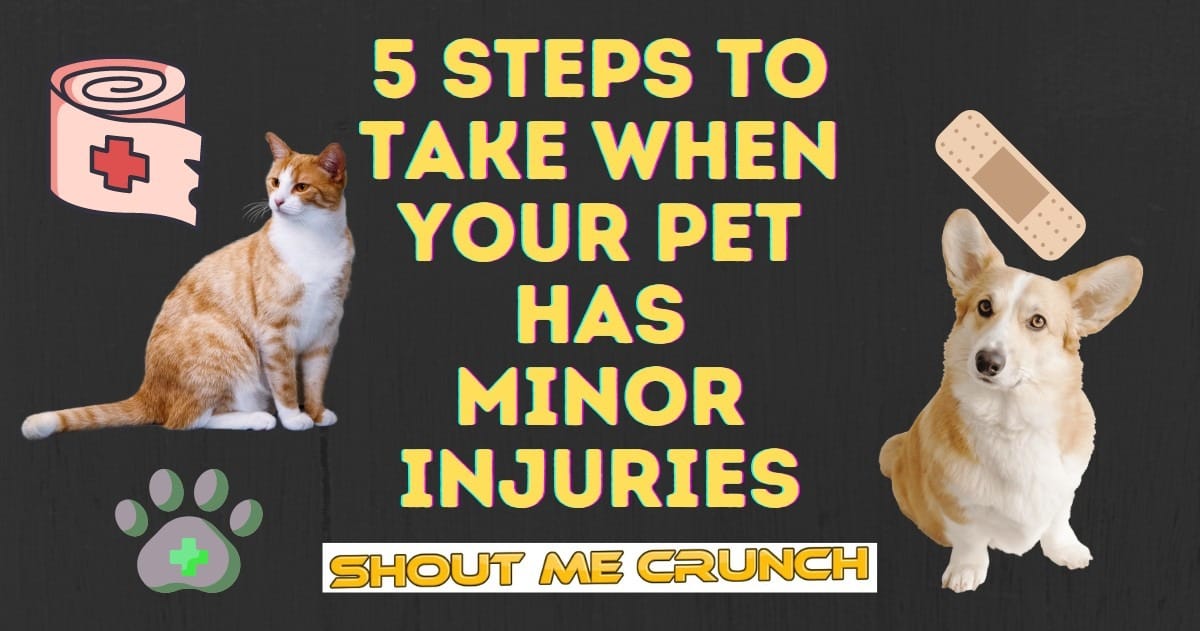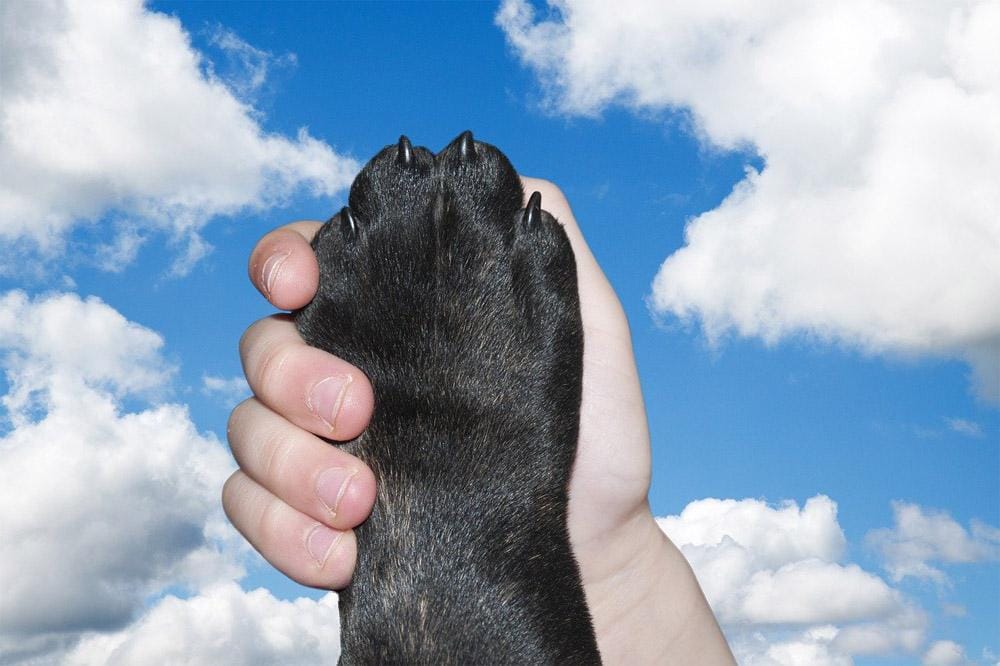If your pet gets a small cut or scrape, don’t worry. Just follow these five steps for a quick recovery.
You care for your four-legged friend and want to keep them safe. Of course, regular veterinary care is essential, and you don’t hesitate to take them to the vet when they’re sick, but what about when they get hurt? Read this article from first to last to know more about what to do when your pet gets injured.
Should you keep an eye on them or wait until they become more significant problems? First, let’s talk about how to spot minor injuries on pets and what you should do if your four-legged friend gets hurt.

Five steps to take when your pet has minor injuries
1. Check the injury
The first thing to do is look at the injury. Look at your pet and decide what kind of injury they have. How dangerous is it? Is the cut bleeding? If so, how much blood is spilled? Is it swelling? If so, how bad is this swelling? Is it painful, or has your pet lost any mobility in that area because of pain or a deformity caused by the injury? Are there any other signs of distress, like vomiting or diarrhea, since an injury like this could cause them a lot of pain on top of whatever damage may have been done by getting hit by something hard enough to break the skin?
2. If it’s bleeding, hold the pressure on it.
If your pet is bleeding, the most important thing you can do is apply pressure for 10 minutes. If the bleeding does not stop after that time, take your pet to a vet immediately. If the wound is small, use a clean cloth to put pressure on it; if it’s bigger than a fingertip or toe, press down on it with your hands. Next, apply direct pressure with gauze or towels to stop the bleeding. If you have a bandage, wrap it around the wound and secure it with tape. If not, make a bandage out of cloth. Do this until it stops flowing entirely. If you need to, put pressure on broken bones until they stop moving around in their sockets.
3. Take your pet to a vet
If you think that your pet needs to see a vet, call ahead. Many clinics are open 24/7 and can get you in right away. Then, they can set up an appointment if they still need to. For example, if your pet has a severe injury and is bleeding heavily, immediately take them to an emergency veterinary clinic. Call 911 or search online for “pet urgent care near me” instead of calling your local vet clinic if the injury is less severe but needs immediate care.

If you have time before taking your pet to the vet, keep their body temperature stable (most dogs’ normal temperature range is between 100 and 102°F) by keeping them warm with blankets or heat lamps.
4. Call your vet right away
In case your pet has a minor injury, the first thing you should do is call your vet. The vet will be able to fit you in if they know that an emergency is coming their way.
If the vet has no appointments available on the same day, they can tell you what days and times are best for more minor injuries like these. This can save both of you time so that you don’t have to spend hours on something small like this.
5. Stay Calm
When dealing with minor injuries to your pet:
• Staying calm is the most important thing for your and your pet’s health. Panic is contagious and can quickly spread to other people, so try to stay calm even in a stressful situation. If you need help with this step, call a friend who can be a calming presence while you take care of your hurt pet.
•Please don’t move the injured animal unless necessary: Moving an injured animal could worsen the injury and make it harder for the animal to get better after it has been treated by a veterinarian or other professional medical worker who cares for sick or injured animals. In the best case, move them just enough so they don’t hurt themselves more by moving around too much, and only move them when you have to!
What are some common minor injuries in dogs?

Dogs often get minor injuries like cuts, scrapes, and bruises, as well as sprains and strains. Most of the time, these types of injuries can be treated at home, but it’s always a good idea to talk to a vet to ensure the treatment is proper and to rule out any serious problems. Other common minor injuries to dogs include:
- Splinters
- Bug bites
- Hot spots (moist dermatitis)
- Mild eye injuries (such as debris in the eye)
- Ear infection
- Nail injuries (such as a torn or broken nail)
It’s essential to watch your dog for any changes in behavior or symptoms and to get veterinary care if the injury seems more severe or if your dog is in a lot of pain.
What are some common minor injuries in cats?

Like dogs, cats can get minor injuries like cuts, scrapes, and bruises. They may also get sprains or strains, and they may be more likely to get certain kinds of injuries because of the way they act and live, such as bites or scratches from fighting with other animals.
It’s essential to watch your cat for any changes in behavior or symptoms and to get veterinary care if the injury seems more severe or if your cat is in a lot of pain. As with dogs, it’s always a good idea to talk to a veterinarian to ensure the proper treatment and rule out any serious problems.
Emergency first aid kit for pets
A first aid kit for your pet in an emergency is a good idea. Some things that you might want to include in your kit are:
- Gauze rolls and adhesive tape can wrap wounds or cover bandages.
- Scissors and tweezers: Scissors can be used to cut bandages and little fur, and tweezers can be used to remove splinters or ticks.
- Cotton balls and swabs can clean wounds and put medicine on them.
- Antiseptic wipes can be used to clean wounds and prevent infections.
Hydrogen peroxide:
This can be used to clean wounds and make people vomit (however, always check with your veterinarian before administering hydrogen peroxide).
This can be used to rinse eyes or wounds.
Anti-inflammatory drugs:
These can be used to reduce swelling and pain.
Antibiotic ointment:
This can be used to prevent infections.
Sterile gloves:
These can be worn when treating wounds to avoid getting an infection or spreading germs.
A muzzle:
This can stop your pet from biting or scratching when it is hurt or in pain.
Also, it’s a good idea to include a list of emergency phone numbers, such as the number for your vet’s office and the nearest animal hospital. It would help if you also thought about adding any relevant medical records or information about your pet’s health history.
Shout Me Crunch previously posted an article about “7 Helpful Tips to Protect Your Dog’s Paws” if you get time, read that too.
Conclusion
Injuries to pets are common, and they can be frustrating. But with the proper care and treatment, your pet will return to normal. Remember that your pet is not a person. They are animals with different needs than humans regarding healing from injuries. They need extra care, so don’t be afraid to take them to the vet if you are worried about how bad their injury might be!



![What Is Data Recovery & How Does It Work? [2019] data recovery hdd](https://www.shoutmecrunch.com/wp-content/uploads/2019/10/data-recovery-hdd.jpg)




